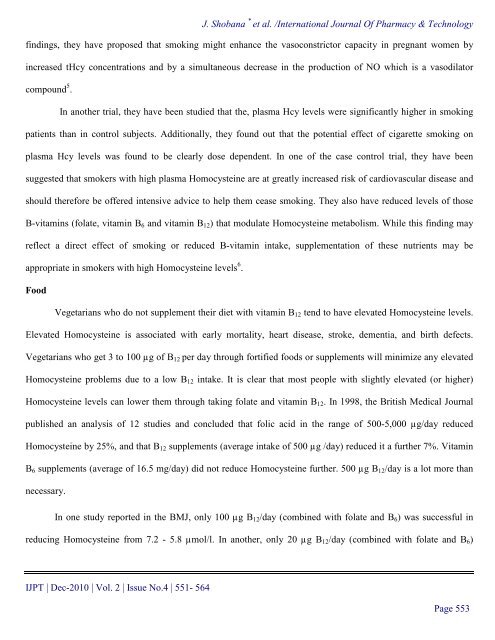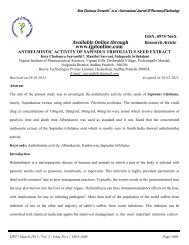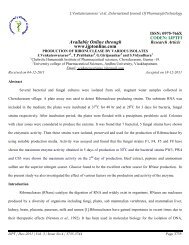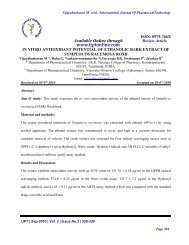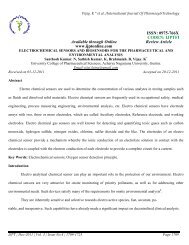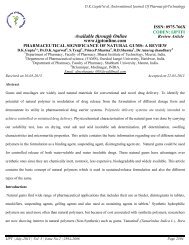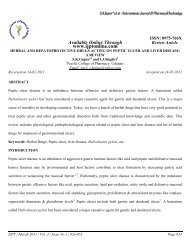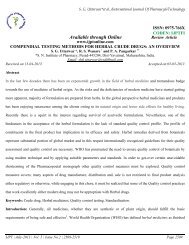Available Online through - International Journal of Pharmacy and ...
Available Online through - International Journal of Pharmacy and ...
Available Online through - International Journal of Pharmacy and ...
Create successful ePaper yourself
Turn your PDF publications into a flip-book with our unique Google optimized e-Paper software.
J. Shobana * et al. /<strong>International</strong> <strong>Journal</strong> Of <strong>Pharmacy</strong> & Technologyfindings, they have proposed that smoking might enhance the vasoconstrictor capacity in pregnant women byincreased tHcy concentrations <strong>and</strong> by a simultaneous decrease in the production <strong>of</strong> NO which is a vasodilatorcompound 5 .In another trial, they have been studied that the, plasma Hcy levels were significantly higher in smokingpatients than in control subjects. Additionally, they found out that the potential effect <strong>of</strong> cigarette smoking onplasma Hcy levels was found to be clearly dose dependent. In one <strong>of</strong> the case control trial, they have beensuggested that smokers with high plasma Homocysteine are at greatly increased risk <strong>of</strong> cardiovascular disease <strong>and</strong>should therefore be <strong>of</strong>fered intensive advice to help them cease smoking. They also have reduced levels <strong>of</strong> thoseB-vitamins (folate, vitamin B 6 <strong>and</strong> vitamin B 12 ) that modulate Homocysteine metabolism. While this finding mayreflect a direct effect <strong>of</strong> smoking or reduced B-vitamin intake, supplementation <strong>of</strong> these nutrients may beappropriate in smokers with high Homocysteine levels 6 .FoodVegetarians who do not supplement their diet with vitamin B 12 tend to have elevated Homocysteine levels.Elevated Homocysteine is associated with early mortality, heart disease, stroke, dementia, <strong>and</strong> birth defects.Vegetarians who get 3 to 100 µg <strong>of</strong> B 12 per day <strong>through</strong> fortified foods or supplements will minimize any elevatedHomocysteine problems due to a low B 12 intake. It is clear that most people with slightly elevated (or higher)Homocysteine levels can lower them <strong>through</strong> taking folate <strong>and</strong> vitamin B 12 . In 1998, the British Medical <strong>Journal</strong>published an analysis <strong>of</strong> 12 studies <strong>and</strong> concluded that folic acid in the range <strong>of</strong> 500-5,000 µg/day reducedHomocysteine by 25%, <strong>and</strong> that B 12 supplements (average intake <strong>of</strong> 500 µg /day) reduced it a further 7%. VitaminB 6 supplements (average <strong>of</strong> 16.5 mg/day) did not reduce Homocysteine further. 500 µg B 12 /day is a lot more thannecessary.In one study reported in the BMJ, only 100 µg B 12 /day (combined with folate <strong>and</strong> B 6 ) was successful inreducing Homocysteine from 7.2 - 5.8 µmol/l. In another, only 20 µg B 12 /day (combined with folate <strong>and</strong> B 6 )IJPT | Dec-2010 | Vol. 2 | Issue No.4 | 551- 564Page 553


